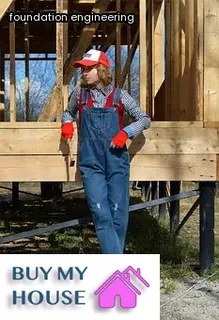When it comes to real estate transactions, understanding the potential risks associated with foundation issues is critical for a successful transaction. Home inspection and structural engineers are qualified to provide assessments of the condition of a home’s foundation but buyers should also be aware of potential risks.
Issues such as water infiltration, soil erosion, and improper drainage can cause significant damage to a home’s foundation if left unchecked or ignored. Foundation problems can range from minor cracking in walls or ceilings to large shifts in the structure, which can lead to expensive repairs.
In addition, foundation problems can increase the risk of instability, leading to further damage and safety hazards. When purchasing a home it is important to be aware of these risks and understand different strategies for navigating them during the home inspection process.

When looking at a potential real estate purchase, it is important to look out for warning signs of foundation issues. Cracking walls, uneven floors, and gaps around windows and doors are all red flags that the home may have structural integrity problems.
It is also important to check the basement or crawl space for water seepage or standing water, which can be indicative of foundation issues. Additionally, sloping or sticking doors and windows could be an indication that the foundation has shifted.
Foundation issues can be costly to repair and should not be taken lightly when considering a home purchase. Professional inspections are highly recommended when purchasing a home in order to identify any existing issues with the foundation before committing to a purchase.
When it comes to real estate transactions, foundation issues can be one of the most daunting and potentially costly repairs that a potential homebuyer may face. Although there are many causes of foundation problems in homes, some of the more common ones include water damage, poor soil conditions, inadequate drainage systems, and structural instability due to age and wear.
Water damage is often caused by leaks or flooding which can cause excessive moisture in the soil and weaken its stability. Poor soil conditions such as expansive clay soil or loose sedimentary fill can also lead to foundation settlement over time.
Inadequate drainage systems can cause water to pool around the foundation and increase the chance of settlement or cracking. Lastly, structural instability due to age and wear is especially common in older homes where foundations haven’t been reinforced for years or decades.
Foundation repair experts are best suited to assess each individual situation and recommend an appropriate solution. However, understanding these common causes of foundation issues can help guide buyers through their home inspection process with confidence that they are making an informed decision when it comes to their home purchase.

When evaluating a property for its real estate value, it is important to assess the foundation for any signs of damage. Different types of foundational damage can have varying effects on the value of a home.
Shifting or settling foundations can cause cracks in walls or ceilings, and may indicate that structural repairs are necessary. Heaving foundations, which occur when the soil expands due to moisture content, can also cause cracking and other structural damage.
In extreme cases, the home may need to be demolished and rebuilt from scratch. Other common types of foundation damage are corrosion caused by water seepage or faulty drainage systems, soil erosion due to insufficient grading around the foundation, mold or mildew growth due to inadequate ventilation and air circulation in crawlspaces or basements, and termite infestation.
All of these issues must be addressed before determining the true market value of a home since they all have significant impacts on the condition of the structure itself.
When purchasing a home, it is important to be aware of foundation issues that can arise. Home inspections are a vital part of the process as they provide potential buyers with insight into the condition of the property.
However, navigating foundation issues during a real estate transaction can be complicated and difficult to manage. To ensure success when purchasing a home with existing or potential foundation issues, it is essential to understand what factors to look for and how to address them accordingly.
Aspects such as soil type, grading, drainage, structural integrity, and other environmental factors must be taken into account in order to determine the level of risk associated with any given foundation issue. Additionally, it is important to research local building codes and regulations surrounding foundation repairs prior to making an offer on a home.
Finally, consulting an experienced inspector or engineer can help clarify any necessary steps for addressing underlying foundations concerns before closing on the property.

Investigating potential solutions to correcting foundational problems in homes is an important part of navigating home inspection issues when dealing with real estate transactions. Homeowners should assess the severity of any structural damage before making a decision on how to proceed.
In some cases, a simple repair or reinforcement may be sufficient and cost-effective, while other issues may require more extensive work such as replacing load bearing walls or installing new support beams. It is also important to investigate alternative methods of rectifying these problems such as underpinning or piering techniques that can be used to strengthen the foundation without having to demolish and start again.
Properly assessing the root causes of any foundation problems can help homeowners make informed decisions about appropriate solutions that provide lasting results.
When navigating home inspection foundation issues in real estate transactions, comparing costs between DIY and professional solutions for fixing foundations is an important step. Homeowners often wonder if they should attempt to fix the problem themselves or hire a contractor.
DIY solutions can be less expensive in the short-term, but without proper knowledge and experience they may end up costing more in the long run. Hiring a professional contractor can be more costly upfront, but they come with experience and expertise that reduces mistakes and ensures long-term stability of the foundation.
It is also important to consider the time it takes to complete each fix as well as any permits or inspections needed for certain projects. Ultimately, when deciding between DIY or a professional solution for foundation repairs, homeowners must weigh both cost and quality of work to make an informed decision that best fits their situation.

Navigating home inspection foundation issues in real estate transactions can be a daunting task. Professional inspection services can help identify and address foundational flaws, ensuring that the buyer or seller is making an informed decision.
Home inspectors are trained to recognize warning signs of potential structural damage that may go unnoticed by untrained eyes. By utilizing their expertise, sellers can be aware of any problems prior to listing a property, while buyers can rest assured that they are getting what they pay for.
A thorough home inspection should include visual inspections of all walls, flooring, and roofing, as well as moisture testing to detect water seepage or standing water in the basement or crawlspaces. If any major deficiencies pertaining to the foundation are found, a structural engineer should be consulted to determine the best course of action for remediation.
Additionally, homeowners should inquire about any permits required for repairs which may be necessary due to found issues. Taking these proactive steps when inspecting a home will provide peace-of-mind for both parties involved in the transaction and help ensure that all bases are covered before closing on real estate.
When navigating home inspection foundation issues in real estate transactions, it is important to examine the structural elements that can be affected by poorly maintained or unrepaired foundations. Issues such as water intrusion, cracks in walls and floors, uneven or sloping surfaces, bowing basement walls, mold, and even detached structures are all indicators of underlying foundation problems.
When assessing the condition of a house’s foundation, it is essential to look closely at signs of settling or shifting. Homeowners should also check for damage to windows and doors caused by movement in the surrounding structure.
Additionally, examining the soil around the exterior perimeter of a home can provide clues about potential drainage problems that may have an impact on foundation integrity. It is also advisable to check for visible signs of leakage or moisture accumulation inside the basement area.
Taking these measures will help ensure that any existing foundation issues are identified before closing a real estate transaction.

When assessing the effects of foundational problems on home value, it is important to understand that any issue with the foundation of a piece of real estate can drastically reduce its value. Home inspection foundations issues are one of the most common issues and can range from structural integrity to drainage issues.
These types of issues should be addressed as soon as possible in order to avoid further damage and ensure an accurate assessment of the home's value. Additionally, it is important to consider the potential costs associated with resolving these types of issues when determining a fair market value for a property.
When navigating this type of situation, it is best practice to consult with an experienced real estate agent who can provide guidance through the process and help assess potential costs related to repairs or alterations necessary to properly address any foundational problems. Taking the time and care upfront to navigate these kinds of situations can help ensure that any transaction involving a property with foundational issues is completed fairly for all parties involved.
When it comes to buying a home, one of the most important aspects to consider is the condition of the foundation. Foundation issues can be costly and time-consuming to repair, so it is important for potential homeowners to understand how to navigate these issues in a real estate transaction.
It is essential that home buyers thoroughly research the property they are purchasing and hire an experienced inspector who can identify any structural defects or other issues with the foundation. Home buyers should also take the time to negotiate with their seller on who will be responsible for paying for any necessary repairs and ensure that any relevant funding sources are available before making a purchase.
In addition, potential buyers should try to get an estimate of how much money they may need to spend on repairs or discuss alternative solutions such as having them completed as part of their closing costs. By taking these steps, homebuyers can help ensure they make an informed decision when purchasing a home with foundation issues.

When it comes to navigating home inspection foundation issues in real estate transactions, investigating the cost of foundation repairs and maintenance is a crucial component. To accurately assess the potential expense of any necessary fixes, an expert should be consulted for an assessment and estimate of the problem.
In some cases, only minor repairs may be needed, such as caulking or sealing cracks or gaps which could prevent water from entering the basement and causing further damage. However, larger repairs like replacing concrete blocks or underpinning can be much more expensive and time-consuming.
Furthermore, ongoing maintenance may also be necessary in order to ensure that the foundation continues to remain structurally sound over time and to avoid costly emergency services down the road. Therefore, when considering a home purchase, buyers should factor in these costs when making their decision on whether to proceed with a transaction or not.
Home inspections are a vital part of any real estate transaction. When considering foundation issues, navigating the process of home inspection can be tricky.
A buyer should always have a thorough understanding of the home's foundation before committing to the purchase. If there are foundation issues that cannot be addressed prior to closing, buyers may want to explore their mortgage options in order to protect their financial interests during this transaction.
While some lenders may require additional down payments or higher interest rates, others may offer loan programs specifically designed for homes with foundation problems. It is important that buyers research carefully and compare different mortgage programs in order to get the best deal possible while protecting their finances from potential long-term risks associated with foundation issues.
Additionally, consulting with a reputable home inspector can provide insight on how to mitigate potential structural damage in the future, and searching for grants or other financing options could also help offset any costs related to repairing a home's foundation. Before signing off on any final documents, it is essential for buyers to ensure they understand all of their financial obligations and are adequately prepared for any costs associated with purchasing a house with foundation issues.

Analyzing if a house is safe to live in with foundation problems is an important part of the home inspection process in real estate transactions. Foundation issues can lead to a variety of potential dangers, such as structural instability, water damage, mold growth, and rodent infestations.
To determine if a house with foundation problems is safe to live in, start by evaluating the severity of the foundation damage. If it's minor and easily fixable, then there may be no need for alarm.
On the other hand, more extensive damage should be addressed immediately by a professional who specializes in foundation repair. Next, take into consideration any other factors that could aggravate foundation issues like soil composition or poor drainage near the house.
Once all aspects have been evaluated, it's important to consult with an experienced real estate agent or inspector to ensure that your decision is informed and secure. With proper assessment and consultation, you can better navigate home inspection foundation issues when looking at real estate transactions so that you can make an informed decision on whether it is safe to live in a house with these potential risks.
When selling a home with foundation issues, making repairs beforehand can often be beneficial for homeowners. Many buyers prefer to purchase properties that are in move-in condition and may be willing to pay more for a house that does not require additional work.
Additionally, potential buyers may feel more confident in their purchase if they know the home is structurally sound. Furthermore, completing repairs prior to listing the property can help expedite the sale and make it easier to find a suitable buyer.
Additionally, thorough inspections can help identify any underlying problems and prevent them from becoming costly surprises later on. It is also important to consider potential buyers’ concerns when deciding whether or not repairs should be done prior to selling the home.
Ultimately, homeowners should weigh the pros and cons of making repairs before putting their house on the market in order to determine what is best for their situation.

When selling a house with foundation issues, it is important to understand the disclosure requirements that apply. Home inspections are essential when dealing with potential foundation problems, as they can identify any existing or potential issues.
Neglecting to disclose the issue can lead to serious legal and financial repercussions for both buyer and seller down the road. It is crucial that sellers take a proactive approach and make sure all necessary information about the home's foundation is disclosed before signing any documents.
Furthermore, buyers should always ask for additional information from the seller and do their own due diligence when looking into potential foundation issues. Doing so will help ensure that everyone involved in the real estate transaction is aware of any potential risks associated with a home’s foundation prior to signing on the dotted line.
Finding a reliable real estate agent who can help you navigate foundation issues in a real estate transaction is essential. Working with an experienced agent can provide invaluable insight into the condition of the property and can also assist you in finding contractors to make necessary repairs.
Before selecting an agent, it is important to research their credentials, including any qualifications they may have regarding home inspection and foundation repair. It is also wise to look into their customer reviews and success rate with prior transactions involving similar issues.
Additionally, it is important to make sure that your chosen agent has experience working with the type of property you are interested in purchasing and that they understand local building codes and regulations. Ultimately, finding a trustworthy real estate agent who can help you manage any potential foundation issues is key for a successful real estate transaction.

When navigating home inspection foundation issues in real estate transactions, researching local disclosure requirements for homes with known or suspected foundational issues is critical. Different areas may have specific regulations concerning what information must be disclosed to potential buyers.
It is also essential to understand if a municipality requires a property owner to fix any identified problems before the sale of the home. Furthermore, it is important to know if any repairs must be completed by licensed professionals and if there are any financial incentives available to help pay for the work.
Additionally, research should be conducted on insurance coverage options that may help protect both buyers and sellers during these transactions. Finally, awareness of local zoning ordinances could impact what sort of repairs are allowed on the property and affect how much can be spent on them.
Understanding all these regulations can help ensure a successful real estate transaction involving homes with known or suspected foundation problems.
When considering the purchase of a home with foundation issues, it can be difficult to determine whether buying it is the right decision. Foundation problems are serious and costly to repair, so understanding all of your options is key.
While it may not always be worth investing in a home that needs extensive foundation repairs, there are steps you can take to ensure that you make the best decision for you and your family. Knowing what questions to ask and what inspections should be conducted by a qualified home inspector will give you an idea of how much work is involved in repairing any existing foundation issues.
Additionally, research into available financing options for making these necessary repairs may ease some of the financial burden associated with this type of investment. Ultimately, navigating the potential pitfalls of buying a house with foundation issues requires careful consideration and planning in order to make sure that any such purchase is truly worth it.

When it comes to navigating home inspection foundation issues in real estate transactions, it is important to take a close look at the foundation. Home inspectors should check for cracks in the concrete or mortar, signs of shifting, water damage, and any other damage that could indicate potential problems with the foundation.
Additionally, inspectors should also look for evidence of settling or corrosion in areas where soil has been disturbed such as around support footings and along walls. They should also assess the condition of structural components such as beams and joists that have been affected by settlement or corrosion.
It is essential to note any visible signs of cracking, bulging, or separation of masonry materials that may indicate structural issues. Lastly, checking for improper drainage and grading can help identify potential foundation problems before they become major issues down the line.
By taking all these factors into consideration when inspecting a home’s foundation, buyers and sellers can be armed with knowledge about potential issues before closing on a property.
Yes, foundation problems in real estate transactions can certainly affect the appraisal. Whether it is a residential or commercial property, appraisers take into account the cost of repairs to address any existing foundation issues.
If there are major foundation issues that need to be addressed, this can have an impact on the overall value of the property. A home inspector should be able to identify any potential foundation issues before a transaction is completed and provide an estimate for repair costs.
Knowing what needs to be done ahead of time can help buyers and sellers adjust their expectations accordingly, as well as prepare for any additional costs associated with addressing these types of problems. Properly navigating home inspection foundation issues in real estate transactions is essential for both parties involved to ensure they are making an informed decision based on accurate information.
When it comes to real estate transactions, navigating home inspection foundation issues can be tricky. The first signs of a potential foundation problem are usually noticed during the initial walkthrough of the property.
Some of these red flags include cracks in walls, floors that are uneven, doors and windows that don’t open or close properly, and gaps around window frames or exterior doors. Other warning signs could be wall separation from ceilings or floors, sticking windows and doors, sloping floors, and bowed or cracked walls.
If any of these indicators appear during the walk-through process, it is important to contact a professional inspector for further evaluation. A qualified inspector can assess the extent of any underlying damage as well as develop a plan for necessary repairs.
Taking steps early on to identify and address foundation issues can save homeowners time and money in the long run.
A: The USDA provides the Residential Structural Inspection Guide, which outlines specific criteria for evaluating foundations and other structural components of a residential property. The guide also lists considerations for determining whether or not remedial action is required to address any observed deficiencies.